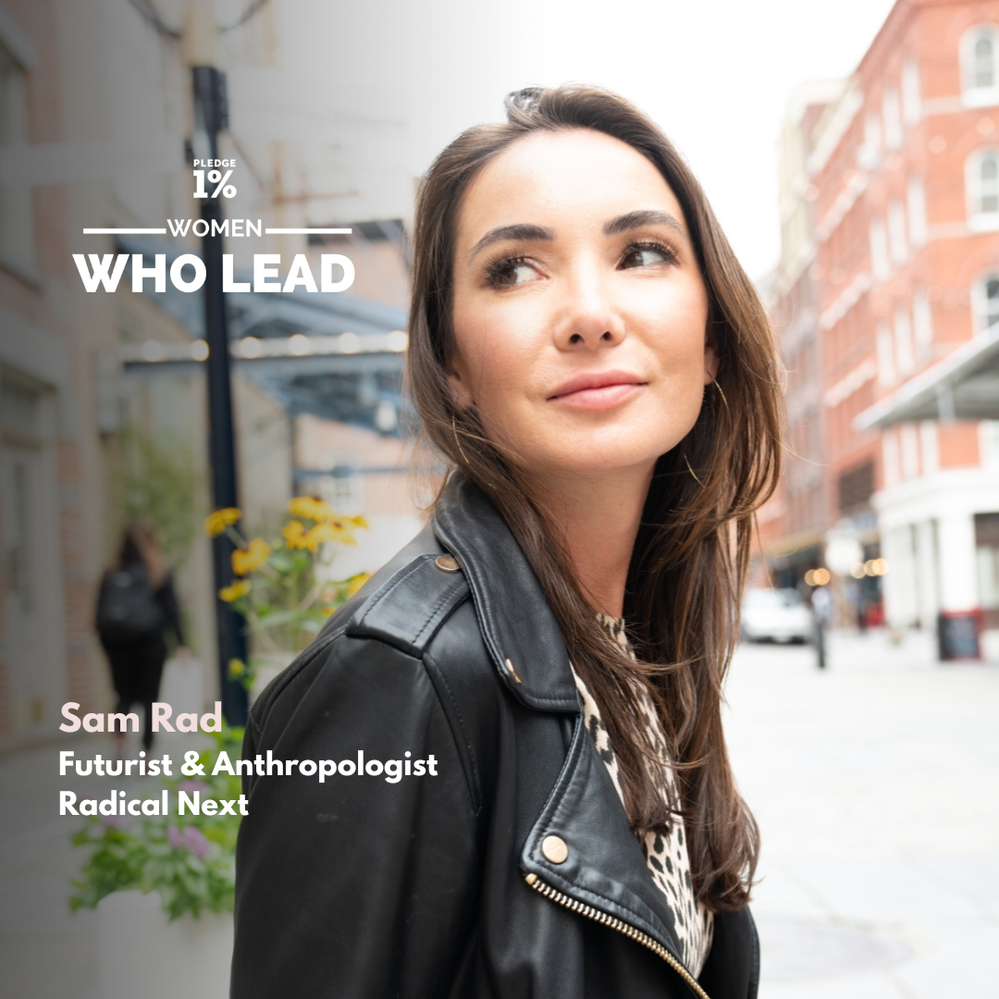Sam Rad
Futurist & Anthropologist, Radical Next
New York, NY
If you could describe yourself in one word, what would that be and why?
Curious. For as long as I can remember, I have been driven by my curiosity and eagerness to learn through experience. I call myself a “student of humanity” for this reason. I am an anthropologist who has lived in the most remote jungles and farthest reaches of the internet’s virtual communities; nn ex-professional skydiver who learned to fly, then jump out of planes — out of an interest for physics; a storyteller who found herself subject to a documentary tv series, more than one.
I live life fully present and immersed, which shapes my viewpoint of the future.
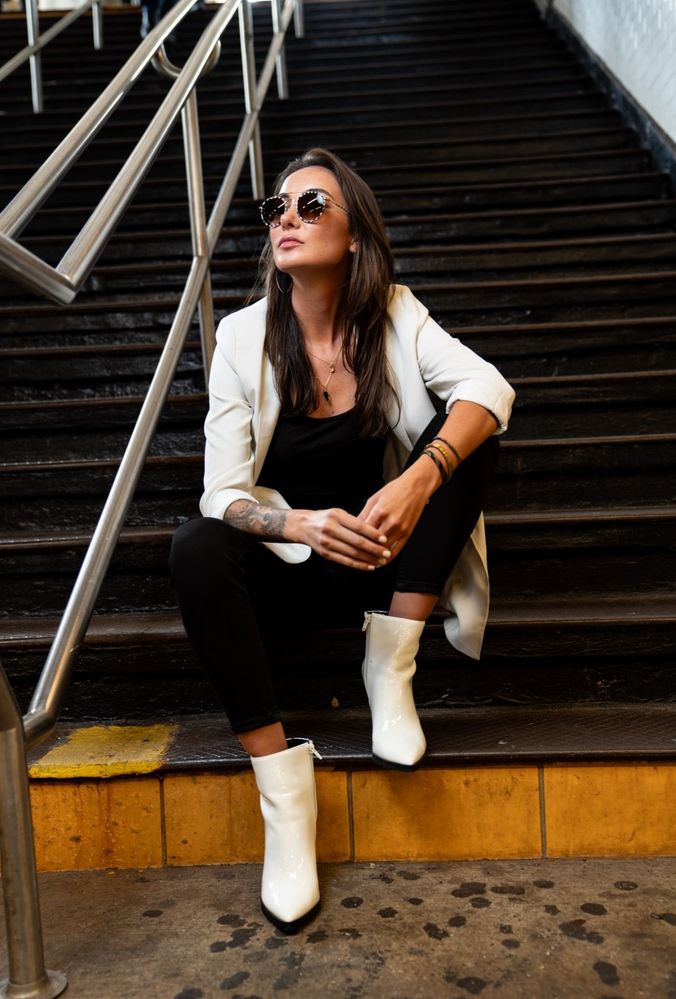
Pledge 1% provides a framework for businesses to do good. Do you think it’s important for today’s corporate leaders to prioritize social impact? If so, why?
I’ve built 4 successful technology companies, written 2 books, and helped invent some of the most impactful technologies of this century — and what is the one thing that has driven me?
Was it money? No. Recognition? No. It’s purpose.
I consider myself of service to humanity and my particular role is educating leaders on stages and other channels as what I call a “metamedia storyteller.” I share stories that shape a positive future. And in that respect, everything I do prioritizes social impact. If not, what else are we all doing here as human beings?
Do you give back to the community with your team and work? If so, what does this look like?
For every speech I give or business I help get off the ground I donate my time pro-bono to projects shaping the future. I’ve traveled around the world empowering folks with technology knowledge, communication strategies, and more importantly, learning from them as teachers so we can more directly integrate our global shared experiences. Last year, I lived in remote villages deep in the Amazon (Peru and Brazil) working towards new models of rainforest regeneration and economic development.
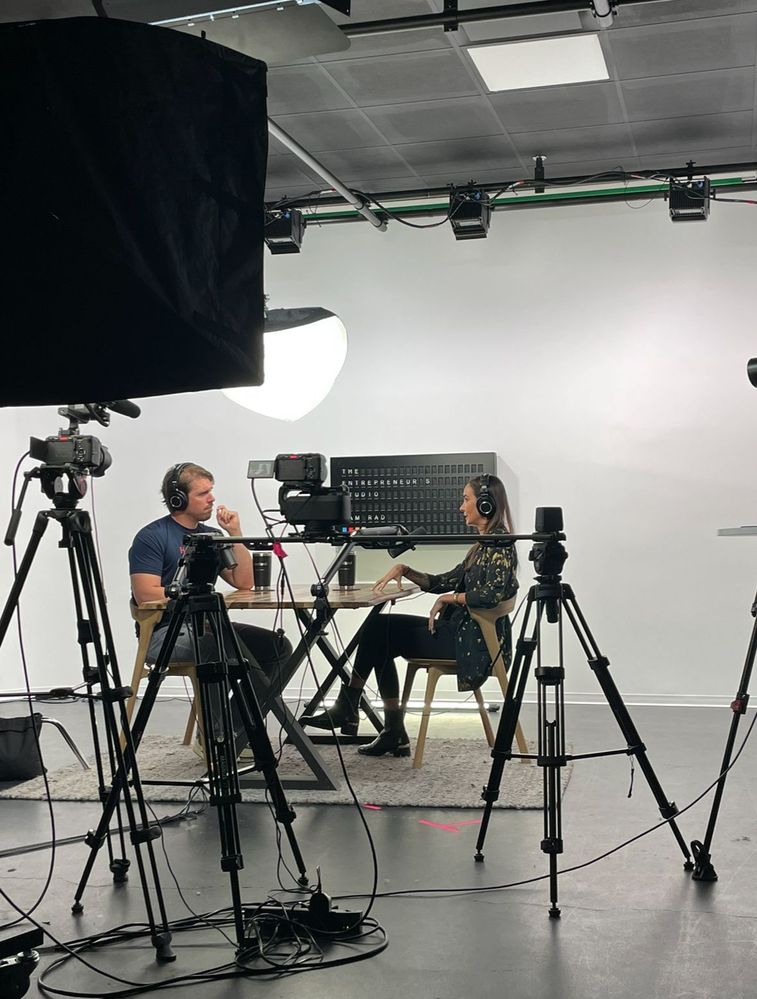
What’s the best piece of advice you’ve ever received?
Keep shining your light. Shine bright and radiate radically. Because your light will be needed in the darkest of places.
That’s not always easy, but if you know you are living your purpose and mission, you will have the strength to forge ahead.
So what’s the mantra I live by?
BE AUTHENTIC. Once you align to your authenticity, share your beautiful unique light and gifts with the world to make an impact where it’s needed most. Leave your ego at the door.
Once you align to your authenticity, share your beautiful unique light and gifts with the world to make an impact where it’s needed most.
This year’s International Women’s Day themes are focused on investing in women and inspiring inclusion. What can we do to make today’s workplaces more equitable and inclusive for women?
1 Compensate women accordingly.
2 Fund female founders.
3 Hold space for different forms of thinking — for example creative or radial thinking versus logical or deductive reasoning.
What advice do you have for women who are just starting their career?
The left brain (logic) and right brain (creativity) are skills needed to navigate this world.
For much of human history, our societies have valued the very “masculine” energetic approach to logic and reason, while discounting creativity and emotion.
In the Age of Acceleration, characterized by AI, quantum computing, spatial computing, and beyond — where our very logic and reason is in question — the most important skills are our human intuition, creativity, and empathy. These are historically considered “feminine” skills (not to gender this concept, it’s just from a spiritual or historical perspective). So I thought, let the “experts” lead here in this age. Women, it’s your time to shine. Lead with the strength of your creative, flowy, intuition.
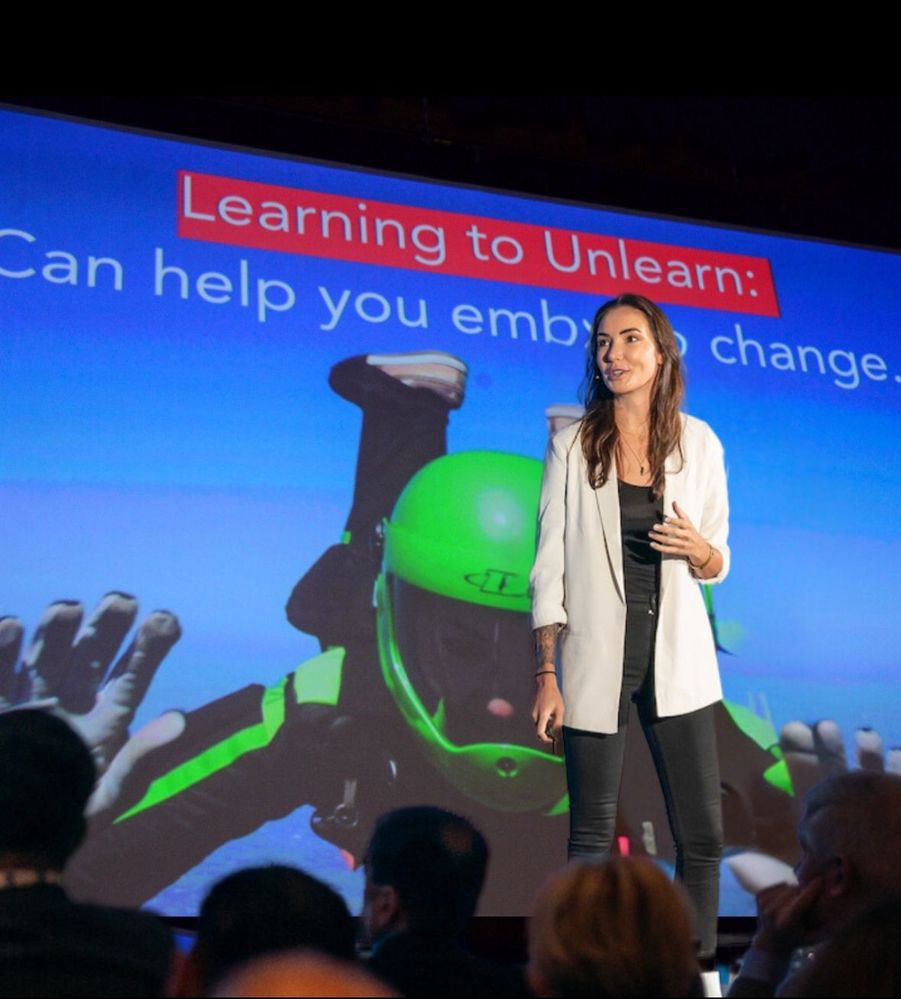
What are you looking forward to this year? Are there any goals (personal or professional), activities, or experiences you are excited about?
I am releasing my next book, Radical Next: Self and Society in the Age of Acceleration in the Fall of 2024.
I’ll be traveling the world sharing stories of radical transformation on 6 continents (maybe 7… and let’s aim for Space too?!). I have a few video and documentary projects in pre-production that I’m excited about. And overall, continuing my work to guide people through times of radical and accelerating change.

Original article here
Author: Deloitte
Corporate philanthropy has long been held to the standards of both business and traditional philanthropy. Too often, it falls short in both, and ends up marginal for corporations and marginal for philanthropy. But there’s now an opening for a new corporate philanthropy model to emerge—one that is uniquely its own.
Shifting the philanthropy strategy
A new era of opportunity in corporate philanthropy
Corporate philanthropy is caught between two paradigms.
It’s expected to deliver quick, measurable returns on investment as a business would—even when it’s addressing challenges where progress is hard to quantify. And it’s also expected to succeed by the standards of a traditional philanthropic foundation, but without the deep financial pockets and singular focus on charity. At the same time, corporate philanthropy is being asked to do more than ever before. The world’s disparities and injustices have become harder to ignore. The first few years of this decade have already seen a global pandemic, a widespread reckoning on racial justice, and climate-related disasters. Those shifts spurred greater social consciousness that has led consumers, employees, and the public to push organizations to make philanthropy a bigger priority.
These circumstances have made it difficult for corporate philanthropy to reach its potential. Difficult, but not impossible. To meet today’s challenges, corporate philanthropy can move beyond the paradigms that limit it, towards a uniquely new model.
“It’s up to companies to tear away the sediment of old ways of creating social good.”
-John Brothers, president of the T. Rowe Price Foundation.
Understanding the “Edges” of corporate philanthropy
Finding a new way forward starts with finding the “Edges,” critical frontiers of philanthropic practice that are particularly well-aligned to broader shifts in society. Exploring these Edges can help the organization discover more equitable and effective approaches to corporate giving, including:
- Rethinking corporate philanthropy’s role
How corporate philanthropy leaders are moving beyond just grantmaking to rethink the ways they add value - Balancing power
How corporate philanthropies are navigating the inherent power dynamics in the ways they approach their work - Acting with others
How corporate philanthropies are expanding impact via collaboration within and beyond the private sector - Creative funding mechanisms
How corporate philanthropies are allocating and disbursing funds in new ways
By experimenting along these Edges, pioneering corporate philanthropy leaders have already begun to discover new ways to shape and grow their impact. Their experiences serve as an invitation for everyone to reimagine their giving strategies and a model for how organizations can use their strengths to address society’s biggest challenges.

Original article here
Author: Brooke White
This year, KCare is proudly pledging 1% of our profits to Voices for Children reaffirming our ongoing commitment to giving back to our community. Voices for Children is a nonprofit organization that pairs caring volunteer advocates with children in foster care, ensuring these children have a voice and a champion—someone who is always looking out for their best interests.
What is a Court Appointed Special Advocate?
Children in foster care have often experienced abuse and neglect, and they are unprepared to navigate the complexities of social workers, court hearings, attorney visits, new homes, and new schools that come with the dependency system. Court Appointed Special Advocates (CASAs) are volunteers from all backgrounds who commit to advocating for the needs of the child or sibling group they are matched with.
A CASA foster care advocate routinely reports on a child’s progress and needs, communicates with professionals on their behalf, and provides judges with insights to help make informed decisions about the child’s future. Court Appointed Special Advocates also assist with practical problem-solving, such as ensuring a child gets glasses or their records are transferred to a new school, so none of the little things get overlooked. Over time, a CASA often becomes the most consistent person in a child’s life, creating a caring and reliable presence for a child in foster care.
Meet Tati Fregosi, a Court Appointed Special Advocate & One of Our Own
Tati works for KCare’s parent company, Radicle Health, and brought Voices for Children to our attention when we were seeking nonprofits for our annual Pledge 1% donation. Tati has been a CASA for Voices for Children in San Diego since February of 2023.
Tati first learned about Voices for Children over a decade ago, while working for an international child advocacy organization. At the time she was advocating for youth in the child welfare system on a large scale, but she was drawn to the idea of providing the personal attention and consistency needed to make a big difference for one child.
She has now had the privilege of supporting the same youth for the past year and a half and says that seeing the positive impact of their trusted relationship has been incredibly rewarding. The youth Tati supports is overcoming unimaginable obstacles and traumas, and together, they have navigated many ups and downs. With care, consistency, and safety in their relationship, this youth has progressed from flunking out of school to being on the principal’s honor role. Tati shared:
“She is amazingly resilient, and it’s both beautiful and heartbreaking that she’s been able to make such big strides with just the additional relational support and consistency of a CASA volunteer in her life.”
Additionally, Tati says that she cannot “…speak more highly of the value of the CASA program and the amazing role of Voices for Children in not only recruiting and training CASA volunteers, but in continuing to ensure we have the support and resources to meet the complex needs of our youth buddies.” She believes the CASA program is pivotal because it provides youth in foster care with consistent, dedicated adults to advocate for their best interests, ensuring their needs don’t fall through the many cracks of the foster system, so they have the opportunity “to just be kids.”
Interested in Becoming a Foster Care Advocate?
Voices for Children needs your help! This year, an estimated 3,500 children will spend time in foster care in San Diego County and 4,000 in Riverside County after experiencing abuse and neglect. These children need someone to speak up for them– maybe that someone is you! Attend a Volunteer Information Session to learn what it takes to be a CASA. Don’t worry if you have questions, a current CASA will be there to walk you through the process. You also receive 35 hours of training to learn about child development and dependency law, and you’ll have a supervisor to provide resources and support.

You Too Can Donate to Voices for Children
The foster care system is made up of many caring and dedicated professionals who work tirelessly for children who have been abused, neglected, or abandoned. However, the system is overburdened, and the CASA model offers unparalleled support to youth in foster care by empowering trained volunteers to investigate the needs of children and help judges make the best decisions about their futures.
By donating to Voices for Children, you can help provide foster children with consistency, safety, and stability. Your donation will support the recruitment, training, and supervision of volunteer advocates who always have the children’s best interests at heart. Visit Voices for Children’s donation page to make a difference today!
KCare Supports Foster Care Families
The work of Voices for Children is near and dear to our hearts, and we’re proud to support their mission through this year’s Pledge 1% donation. At KCare, we support foster care agencies and families with our suite of EHR software solutions designed for foster care case management. We work hand-in-hand with organizations that make a difference in the lives of children in foster care every day, and we understand the tremendous impact foster care advocates can have on families. Thank you, Voices for Children, for the important work you do!
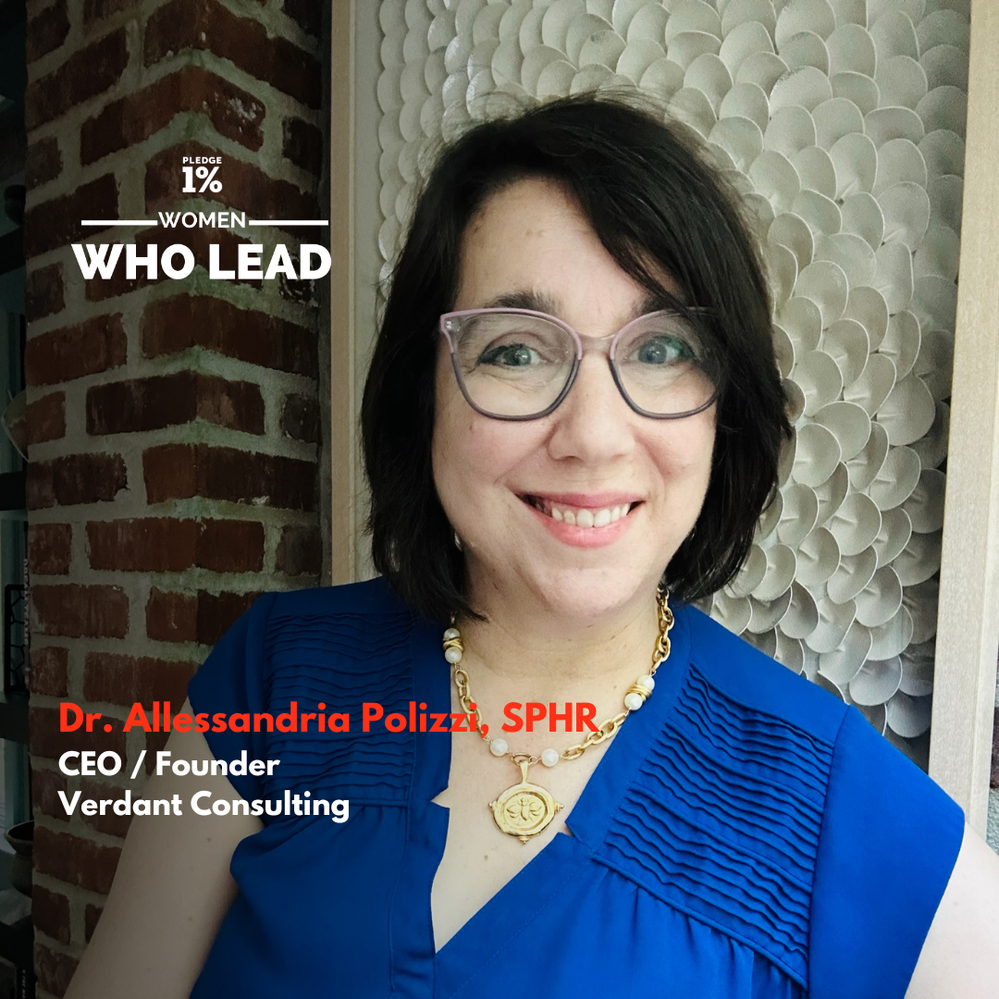
Dr. Allessandria Polizzi, SPHR
CEO / Founder, Verdant Consulting
Sharon, MA
If you could describe yourself in one word, what would that be and why?
Abundant – Starting my own company with a focus on an area that is personally important to me has shown me the breadth of my creativity and ability to make connections for others. People will often comment on how much our company has accomplished and created during the last ~3 years, all of which came from me.
However, what really reflects this is HOW I have grown my business. I believe in leading from an abundance mindset, so when I decided to add an affiliate network to the business in order to scale, it never crossed my mind to charge people. Rather, I focused on finding those underrepresented in the market and offered them the ability to deliver our programs via a reasonable revenue share with no financial investment. This means anything our company creates is available to our affiliates to help them grow their businesses. These partnerships are critical to improving mental health at work, and together, we will create a world where work doesn’t hurt.
Pledge 1% provides a framework for businesses to do good. Do you think it’s important for today’s corporate leaders to prioritize social impact? If so, why?
Absolutely! The communities in which organizations exist influence business performance, culture, engagement, retention, and innovation. We can’t ignore what happens outside of work, as it deeply influences the workplace.
Do you give back to the community with your team and work? If so, what does this look like?
As I mentioned above, we offer our affiliate program for free. If someone is passionate about creating healthier workplaces and can facilitate quality sessions, we work with them to add our programs to their portfolio, as well as provide guidance on growing their business.
One example is a local woman who focuses on DEIB and providing equity audits for organizations. She integrated our resiliency training into her programs, and we taught her how to leverage state training grants to help companies fund her work. Win-Win-Win.
What’s the best piece of advice you’ve ever received?
What we focus on expands.
This year’s International Women’s Day themes are focused on investing in women and inspiring inclusion. What can we do to make today’s workplaces more equitable and inclusive for women?
If we could teach every girl how to practice self-coaching instead of self-criticism, we could change the world. Having worked with 100s of girls through scouting, I have seen the transition girls make as they enter puberty and begin to absorb the pressures and biases of the world around them. Teaching girls self-advocacy and the power of self-compassion can change how their brains develop and create new pathways for their future.
What advice do you have for women who are just starting their career?
See above. Be kind to yourself and practice self-compassion. You will not lose your edge if you speak to yourself with care. Too often, we say things to ourselves we would never say to anyone else. Speaking to ourselves as we would a loved one, making sure we are ok, and taking moments to self-reflect has been scientifically proven to improve our wellbeing and our ability to work with others.
Be kind to yourself and practice self-compassion.
What are you looking forward to this year? Are there any goals (personal or professional), activities, or experiences you are excited about?
Continuing to raise awareness with organizations that #workshouldnthurt and that creating healthy workplaces is good business.
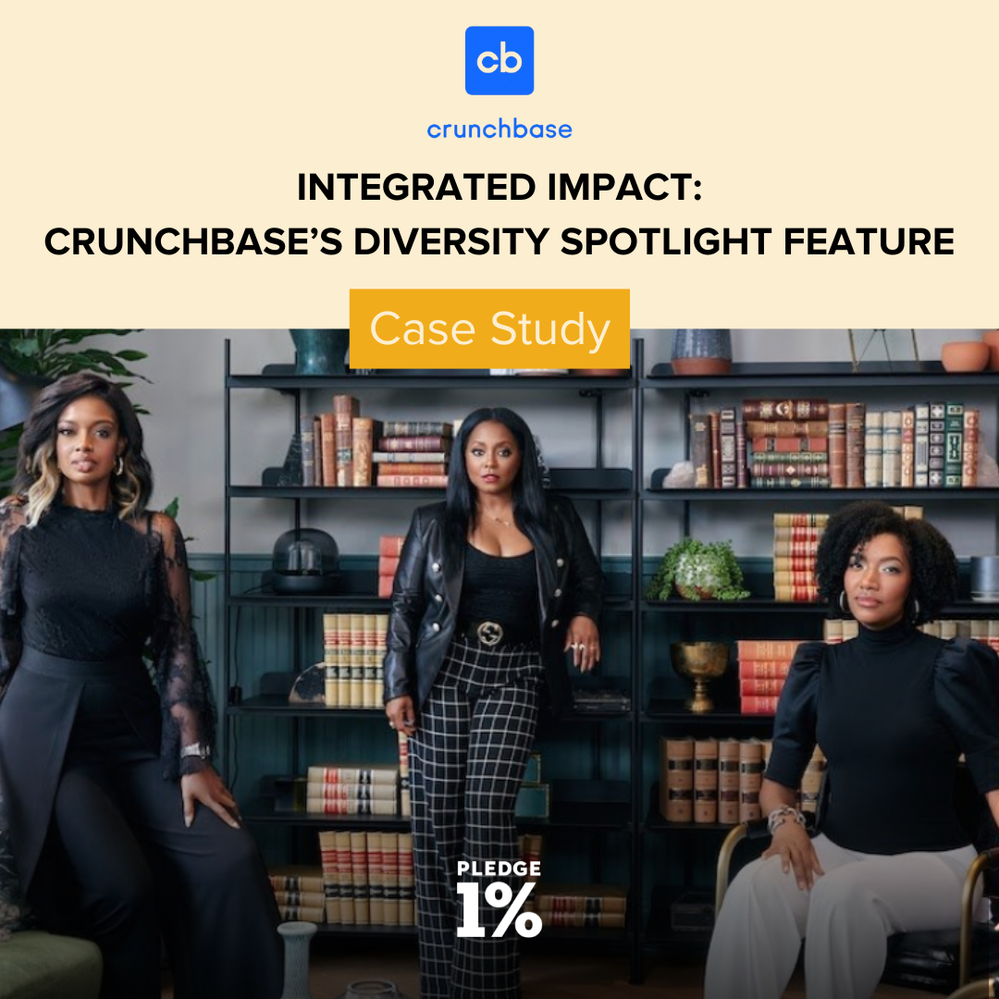
Crunchbase is a U.S.-based company that provides intelligent prospecting software powered by live company data for salespeople, CEOs, and venture capitalists to find and close deals. The company joined Pledge 1% as a Builder in 2018 by pledging equity, time, and product as a way to set an example in the startup community.
Crunchbase first integrated their social impact vision into their products. In 2020, they introduced the Diversity Spotlight to highlight data about companies with diverse leadership and the investors who fund them. They rolled out this feature with key partners like All Raise, BLCK VC, and StartOut when adding LGBTQ+ tags. This feature is helping Crunchbase inspire other companies to drive diversity, equity, and inclusion, and to ultimately close the equity gaps in the startup world.
In addition to these features, Crunchbase encourages its employees to give time via their Volunteer Time Off policy.
Read how Crunchbase is leveraging its platform, team, and equity to inspire a more inclusive and generous startup ecosystem in the case study below.
Crunchbase-Case-Study
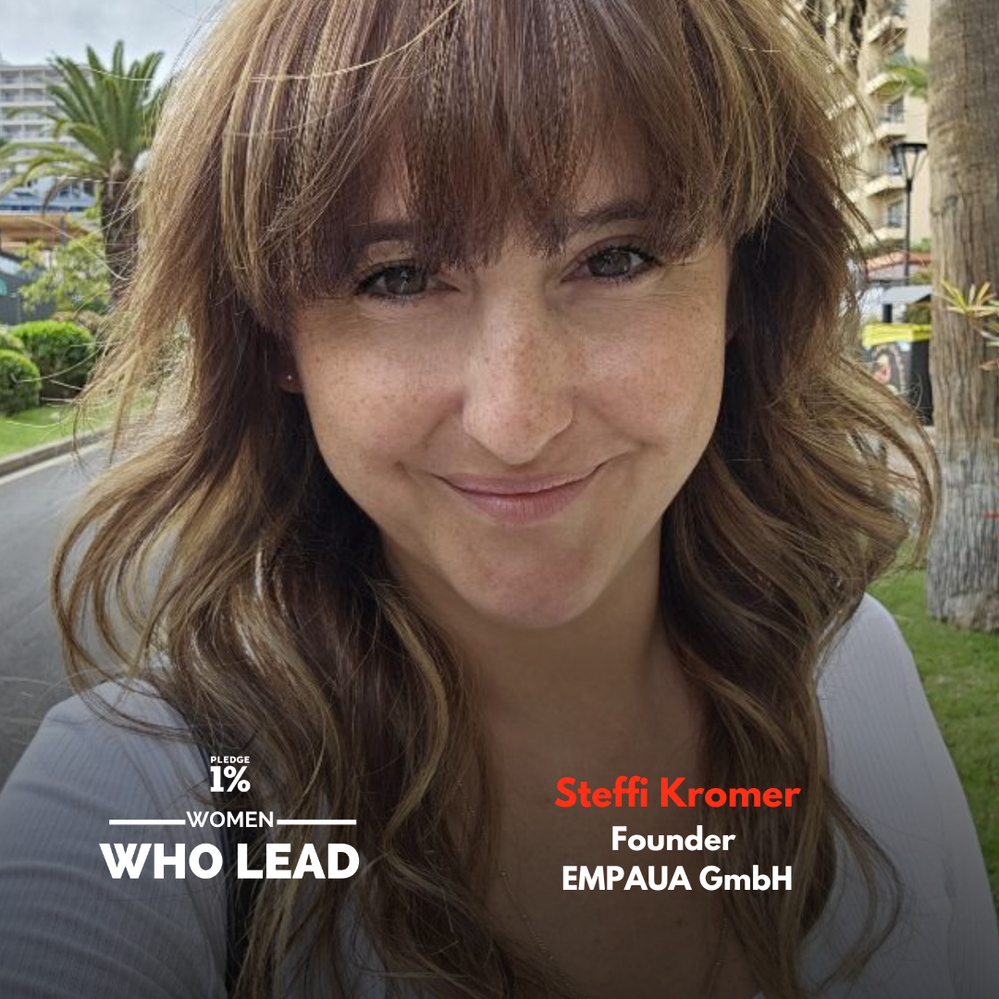
Steffi Kromer
Founder, EMPAUA GmbH
Zurich, Switzerland
If you could describe yourself in one word, what would that be and why?
Efficient! I like to constantly improve processes for our business and our customers, as well as for me personally.
Pledge 1% provides a framework for businesses to do good. Do you think it’s important for today’s corporate leaders to prioritize social impact? If so, why?
Absolutely. With organizations, we have the power and ability to reach many more people and to have a bigger impact than one individual alone. I strongly believe that any organization should have a big focus on giving back. We also need to understand that we, in my opinion, are very privileged to be leaders in companies, and with that privilege should come a sense of responsibility for society, climate and the world.
Do you give back to the community with your team and work? If so, what does this look like?
We are a company that is very open to supporting others in various ways.
In the last years, we for example did internal auctions and donated the raised funds to families in Ukraine, we supported local Covid aid groups, and every employee gets an allowance to donate for their company anniversary and birthday each year.
What’s the best piece of advice you’ve ever received?
Always trust your gut, but keep listening to others.
This year’s International Women’s Day themes are focused on investing in women and inspiring inclusion. What can we do to make today’s workplaces more equitable and inclusive for women?
Make your salaries transparent to your employees!
Like that you can ensure you are paying fair and equal salaries. In recruitment, create a skill-based assessment which is checked before the first interview to ensure no bias is present.
What advice do you have for women who are just starting their career?
Get a female mentor, someone who has been there and done that. Also always support other women, right from the start. But please – also be supportive of men. You always receive what you give in life.
What are you looking forward to this year? Are there any goals (personal or professional), activities, or experiences you are excited about?
I have very exciting travel plans for this year to which I am very much looking forward to. Also professionally I am planning to face myself with some challenges, which I hope will help me grow personally and in business as well.
Always trust your gut, but keep listening to others.
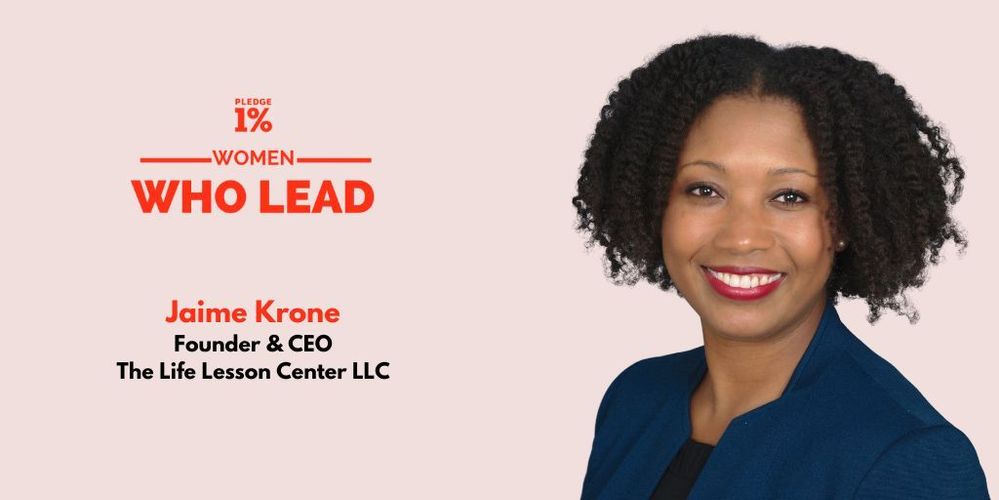
Jaime Krone
Founder & CEO, The Life Lesson Center LLC
Germantown, USA
If you could describe yourself in one word, what would that be and why?
I describe myself as indomitable. Even though I endured many hardships over my lifespan, I still accomplished every goal, I live the life I desire, and I create my destiny. I have just enough grit and rebellion to move me forward, regardless of any obstacle.
Pledge 1% provides a framework for businesses to do good. Do you think it’s important for today’s corporate leaders to prioritize social impact? If so, why?
I think it is important for corporate leaders to recognize that their employees, and their needs, are the priority. If employees are treated fairly and respectfully, that is the greatest social impact.
Do you give back to the community with your team and work? If so, what does this look like?
My team is very small; however, we create a free monthly newsletter for anyone who wants to read it. It includes a relevant topic and helpful energy and supportive tea interventions. Additionally, I provide free field supervision for social work students.
What’s the best piece of advice you’ve ever received?
If you want something that doesn’t exist for you, create it.
This year’s International Women’s Day themes are focused on investing in women and inspiring inclusion. What can we do to make today’s workplaces more equitable and inclusive for women?
I think to inspire inclusion, it is important to recognize personal beliefs that aid in the idea that someone else is unequal. If we look at others as equal to us, and genuinely believe and invest in the idea, there would not be a challenge. If we devalue others and deem them unequal, that is a soul issue that the beholder must work through; policy will not change that.
If we devalue others and deem them unequal, that is a soul issue that the beholder must work through; policy will not change that.
What advice do you have for women who are just starting their career?
Beware of your belief system, invest in grace and compassion for yourself and others, and your success is your responsibility.
What are you looking forward to this year? Are there any goals (personal or professional), activities, or experiences you are excited about?
I’m looking forward to building more miniature shoppes, traveling, and being challenged to see others in the way they desire.
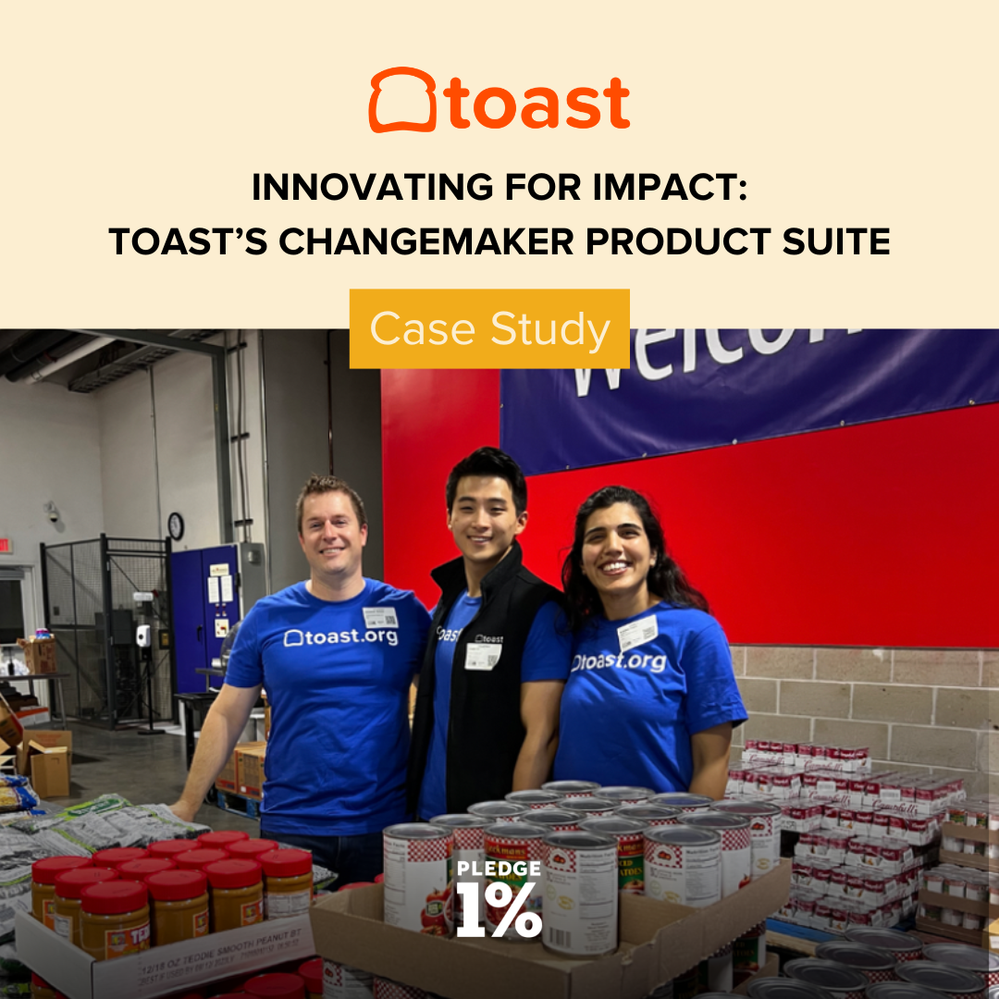
Toast is a cloud-based, all-in-one digital technology platform purpose-built for the entire restaurant community. In 2019, Toast launched its social impact arm, Toast.org, with the purpose of enriching the food experience for all and creating a healthier, more sustainable, and equitable world.
They joined the Pledge 1% movement in 2021 to further activate their philanthropy, people, and product towards this mission. This resulted in the Changemaker Product Suite, which is available to Toast customers for free with the goal of empowering restaurants to be local community hubs. Through this program, Toast has partnered with local organizations on accelerating the development and implementation of scalable food waste solutions, among other things.
In addition, Toast created an innovative three-month rotational program for employees from the R&D team to join the social impact team and see how Toast’s product is impacting customers. This is helping them get internal buy-in all while leveraging the best of their team talent and time to have an impact.
Learn more about how Toast is putting its philanthropy, people, and product pledge to action in the case study below.
Toast-Case-Study
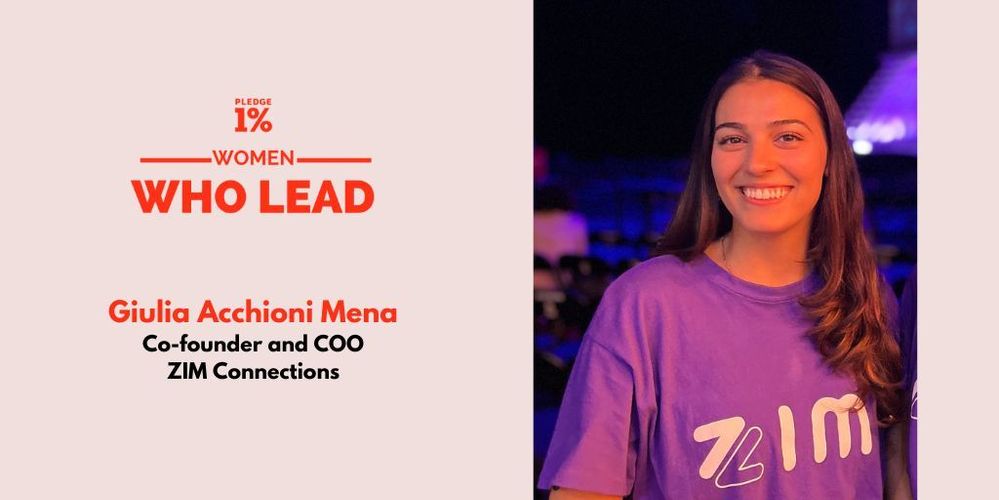
Giulia Acchioni Mena
Co-founder and COO, ZIM Connections
London, United Kingdom
If you could describe yourself in one word, what would that be and why?
Curious, because my personal and professional journey is driven by a deep desire to learn, explore, and understand new cultures, technologies, and ideas, which fuels my passion for ZIM.
Pledge 1% provides a framework for businesses to do good. Do you think it’s important for today’s corporate leaders to prioritize social impact? If so, why?
Absolutely, I believe it’s crucial for today’s corporate leaders to prioritize social impact. In an era where the lines between societal challenges and business opportunities are increasingly blurred, leveraging a platform like Pledge 1% not only fosters a culture of giving back but also aligns a company’s success with the well-being of the broader community. This approach ensures businesses contribute positively to society, driving change and sustainability through their operations. It’s about recognizing that long-term success is intricately linked to the health of the environment we operate in and the communities we serve.
By prioritizing social impact, companies can create a ripple effect, inspiring others to follow suit, thereby amplifying the potential for positive change in the world.
Do you give back to the community with your team and work? If so, what does this look like?
Yes, giving back to the community is at the heart of what we do at ZIM. Our commitment to social responsibility is woven into our business practices, particularly through initiatives that promote digital inclusion and environmental sustainability.
By leveraging our eSIM technology, we not only offer a more sustainable solution by significantly reducing plastic use but also ensure broader access to communication services for underserved communities. Moreover, our dedication extends beyond environmental efforts to embodying true global citizenship. We’ve embraced diversity and inclusivity by employing people from all over the world.
A testament to this commitment is our endeavor to assist an employee from Syria. Facing severe conditions in his homeland, he sought a better future for his family. Recognizing the value he could bring to our team and the difference we could make in his life, we navigated the complex visa process, especially as a Startup, to welcome him and his family to London. Now, two years later, he continues to be a vital part of the ZIM family, exemplifying our belief in the power of technology to not just connect people, but to change lives.
What’s the best piece of advice you’ve ever received?
The best piece of advice I’ve ever received is to “embrace your unique journey and trust the process.” This personal guidance has been a beacon through the ups and downs of entrepreneurship, reminding me that each challenge and success is a step towards realizing our vision at ZIM. It taught me the importance of patience, resilience, and faith in my path, encouraging me to stay true to our mission, even when faced with uncertainty.
This year’s International Women’s Day themes are focused on investing in women and inspiring inclusion. What can we do to make today’s workplaces more equitable and inclusive for women?
To foster more equitable and inclusive workplaces for women, businesses can actively invest in gender diversity initiatives that go beyond surface-level commitments. This involves setting measurable diversity goals and holding leadership accountable for achieving them.
Encouraging a work environment that promotes work-life balance through flexible working hours and remote work options can significantly benefit women, especially those managing family and career responsibilities. Additionally, creating women’s networks within the organization can provide valuable support, mentorship, and advocacy opportunities. These networks empower women to share experiences, challenges, and strategies for success, enhancing their professional growth and visibility in the company. By implementing these concrete actions, companies can make significant strides toward creating a more inclusive and equitable workplace for women.
What advice do you have for women who are just starting their career?
For women just beginning their careers, my advice is to cultivate a strong sense of self-confidence and assertiveness.
Believe in your abilities and value, and don’t be afraid to voice your opinions and ideas. Seek out mentors and allies who support your growth and can provide guidance based on their experiences. Networking is also crucial; build relationships within your industry and beyond, as these connections can open doors to opportunities and offer invaluable support.
Additionally, be open to learning and adapting—your early career is a time for exploration and skill-building. Embrace challenges as opportunities to grow and define your path. Lastly, remember to advocate for yourself, whether it’s in negotiations for salary, roles, or new projects. Knowing your worth and asking for what you deserve is fundamental in building a fulfilling career.
Believe in your abilities and value, and don’t be afraid to voice your opinions and ideas.
What are you looking forward to this year? Are there any goals (personal or professional), activities, or experiences you are excited about?
This year, I’m particularly excited about the journey ahead for ZIM.
I look forward to seeing how our company will evolve, the new challenges we’ll navigate, and the successes that will shape our path. The potential for growth and innovation within ZIM fuels my enthusiasm for the future, as we aim to further disrupt the travel connectivity sector and enhance our offerings.
On a personal level, I aspire to travel more, exploring new cultures and perspectives that can enrich both our business and my personal life. Achieving a healthier work-life balance is also a key goal for me; I believe in the importance of nurturing personal well-being to sustain creativity and drive in professional endeavors.
